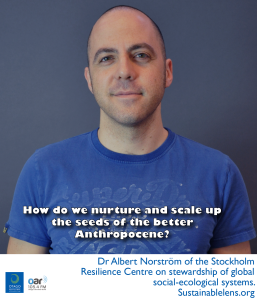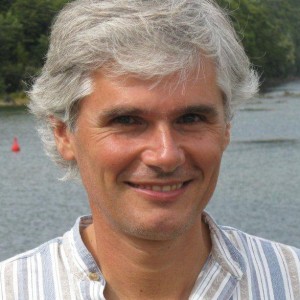How do we nurture and scale up the seeds of the better Anthropocene?
Dr Albert Norström of the Stockholm Resilience Centre is Executive Director of the Programme on Ecosystem Change and Society (PECS). We talk about the role of ecosystem services, our social-ecological systems and how we can scale up the seeds of the good anthropocene.
Talking points
The Millennium Assessment was a great success…but after that there was an effort to identify key knowledge gaps…how regime shifts can affect ecosystem services, how management and governance of ecosystem services should be designed to get the best outcomes in both the social and ecological arena….so a ten year programme to try to address these key gaps…the programme on ecosystem change and society was born.
Social-ecological system are systems in which scientists address both the social and ecological aspects of a specific place and trying to get positive outcomes in both of these arenas.
Regime shifts…events where things are looking pretty good in the ecosystem you are trying to manage, then all of a sudden things go crazy, and teh ecosystem shifts to something completely different to what it was before.
We need to move beyond seeing nature as nature and social systems as social systems, but seeing an holistic interconnected social-ecological system.
I’ve always been interested in issues of equity and justice and all things political.
It was a purposeful evolution in my career: in the beginning I focussed on the ecological dimension, (but as my career has progressed) , I’ve been trying to bring the social dimension into the ecological dimension.
One of the big challenges we have, if we’re going to If we’re going to solve some of the big sustainability problems of the world is to make it easier for the next generation of scholars to wear this transdisciplinary hat… that can very comfortably switch between paradigms and disciplines or work in teams of researchers representing different disciplines.
Current academic structures are silo-disciplinary.
But if you get thrown into this transdisciplinary ocean at the beginning, the risk is that you get washed away because you have no real platform to stand upon.
Bringing people into the mix makes ecosystems much more complex, a necessary step, but it is impossible to improve the functioning of an ecosystem if you don’t understand the livelihoods of the people that live there, how they value nature, their culture, their norms, power dynamics in communities, the myriad of legislative requirements – all of these things influence how people act, or can’t act, and all of these things are extremely difficult to start uncovering.
Academic careers are heavy on rewarding a certain type of CV, heavy to reward quick publications, slow to recognise running courses, or working in transition groups, or other activities that have a long term tangible impact on society.
Understanding range of interconnections that exist in our planet today.
The anthropocene – an era where human activity is now the biggest driver of change on the planet.
Characteristics of the anthropocene include the increasing speed and scale of things.
The real challenge is understanding connections – how a region in the south of Sweden is connected to a place in the Amazon.
We’re still struggling to understand scale… how locales and regions are connected to one another.
How can we design sustainable management policy that is resilient in the face of this big connected human enterprise that is the anthropocene, and at the same time work at the local level.
The anthropocene describes the age of human,s but is is a very small proportion of human species that have shuffled us into the current situation that we’re in, perhaps it should be the capitalcene, or the technocene.
The anthropocene is not totally doomsday, the term gives us the potential to explore the potential of the human species to adapt and transform, to use innovation as a positive force – a potential good anthropocene.
We are all ultimately dependent on the biosphere, dependent on ecosystems to keep producing these goods and services. So the anthropocene means that it is up to us as the human species to become stewards of the biosphere.
I believe that things can definitely get better, there’s a plethora of different initiatives…transition towns are super-inspiring.
Within civil society, within research, government and business, there’s a shift towards interdisciplinarity, towards an acknowledgment that we are so dependent on the biosphere for our future. It’s matter of taking those small initiatives – the seeds, trying to nurture them. we need to understand how to scale up these initiatives – things such as transition towns, urban gardening, guerilla gardening, popping up in different guises around the world – how do we take these, understand these, how they can be scaled up, blended with other similar initiatives to realign the ship towards a better anthropocene.
A problem is the scaremongering focus on doomsday scenario of the anthropocene, the Mad Max approach, is that a lot of these good stories, the seeds , get lost in the reporting.
We can’t go back to pristine, setting conservation targets that have that at the target is nonsensical – we’ve locked these systems into trajectories where we can’t go back. But ecosystems are surprisingly resilient…novel ecosystems, but they still require adaptive responsive management in to order to shuffle them along a pathway where they stay reasonably healthy,
Reasonably healthy systems that aren’t optimised to produce single things…and constant change, not the status quo.
How do we provide tools to social-ecological systems to cope with change?
Ecosystem services have been somewhat hijacked into monetary value, this speaks the value of business, but it forgets the intangible or invisible aspects.
A better anthropocene is one where equity issues are addressed, power issues are addressed, democracy issues are addressed.
Scenarios…thinking about how the social and ecological systems work together, including a long hard think about who the stakeholders are, invite them into the process, participatory stories about the future.
Participatory visioning process, thinking about common futures
Globally we need acceptance of multiple narratives, global sustainability needs to embrace pluraism, multiple pathways expressing similar values.
How do we nurture and scale up the seeds of the better anthropocene?
We will have to embrace diversity to form a global narrative. he dominant narrative is broken: growth, wealth concentration, inequality is broken.
How do we grow small scale innovation into something bigger – a global transformation?
(Success) The sustainable development goals. It is acccepted and acknowledged that we depend on ecosystems and biosphere are a fundament for social development. A a social-ecological perspective has gone from being a tiny area of academia to an integrated part of the biggest global agreement around sustainable development.
(Activist) Yes. I’ve always harboured that streak. It is difficult to set aside, to split yourself up between being a researcher and an activist. In many cases you are both at the same time. I think that is inevitable.
(Motivation) It’s quite simple, I have two daughters, we have to make sure the world is a better place for them.
(Challenges) PECS conference
(Miracle) We would be in the good anthropocene now
(The smallest thing that would make the biggest difference towards this miracle?) Continuing dialogue with people, especially those who don’t share the same views as me.
(Advice) Spread knowledge that in doing this work you are not an isolated speck in the ocean. There’s a lot of activity at different levels, different scales to try to make the world a better place.




